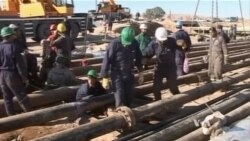World oil prices are at their highest levels of the year as escalating violence in Iraq threatens to disrupt exports.
As a major oil-producing nation, Iraq's political stability is crucial keeping energy prices steady.
But energy analysts say there’s no reason to panic — yet.
As OPEC’s second biggest oil producer, Iraq pumps out more than three million barrels per day, which is why territorial gains this week by an al-Qaida splinter group in oil-producing regions are giving energy markets a case of the jitters.
But the threat may be overblown.
Depending on how long the conflict lasts, only a small increase in gasoline and heating oil prices are anticipated, says Andrew Ricci, a public relations account supervisor with Levick Energy, a Washington-based public affairs and energy research firm.
“The real impact that it’ll have on the United States is that it’s going to empower the arguments for advocates of energy independence, energy stability and clean energy sources.”
Oil prices have been relatively stable for the last four years, partly due to lower demand in developed countries and the rise in alternative fuel sources. There’s also the prospect of currently untapped oilfields from Libya to Iran, says Reuters energy columnist John Kemp.
''First of all, we saw South Sudan, then Libya, then Nigeria," he said. "Iran's oil has been kept largely off the market by sanctions, and, now, we're seeing mounting problems in Iraq, all of which means that you can see lots of oil in the future. But in the near term, the market remains fairly balanced."
But much will depend on whether insurgents are able to gain a permanent foothold in Iraq.
Although the threat of instability has helped push oil futures to highs not seen since last September, the threat of further disruptions may be limited.
Energy analysts say Iraq’s most productive oil fields — some 80-90 percent of total capacity — lie further to the south, in areas unsympathetic to the Sunni-led militants.
As a major oil-producing nation, Iraq's political stability is crucial keeping energy prices steady.
But energy analysts say there’s no reason to panic — yet.
As OPEC’s second biggest oil producer, Iraq pumps out more than three million barrels per day, which is why territorial gains this week by an al-Qaida splinter group in oil-producing regions are giving energy markets a case of the jitters.
But the threat may be overblown.
Depending on how long the conflict lasts, only a small increase in gasoline and heating oil prices are anticipated, says Andrew Ricci, a public relations account supervisor with Levick Energy, a Washington-based public affairs and energy research firm.
“The real impact that it’ll have on the United States is that it’s going to empower the arguments for advocates of energy independence, energy stability and clean energy sources.”
Oil prices have been relatively stable for the last four years, partly due to lower demand in developed countries and the rise in alternative fuel sources. There’s also the prospect of currently untapped oilfields from Libya to Iran, says Reuters energy columnist John Kemp.
''First of all, we saw South Sudan, then Libya, then Nigeria," he said. "Iran's oil has been kept largely off the market by sanctions, and, now, we're seeing mounting problems in Iraq, all of which means that you can see lots of oil in the future. But in the near term, the market remains fairly balanced."
But much will depend on whether insurgents are able to gain a permanent foothold in Iraq.
Although the threat of instability has helped push oil futures to highs not seen since last September, the threat of further disruptions may be limited.
Energy analysts say Iraq’s most productive oil fields — some 80-90 percent of total capacity — lie further to the south, in areas unsympathetic to the Sunni-led militants.





